Related Research Articles

The West Bank, so called due to its relation to the Jordan River, is the larger of the two Palestinian territories. A landlocked territory near the coast of the Mediterranean Sea in the Levant region of West Asia, it is bordered by Jordan and the Dead Sea to the east and by Israel to the south, west, and north. The territory has been under Israeli occupation since 1967.

The Second Intifada, also known as the Al-Aqsa Intifada, was a major uprising by Palestinians against the Israeli occupation, characterized by a period of heightened violence in the Palestinian territories and Israel between 2000 and 2005. The general triggers for the unrest are speculated to have been centered on the failure of the 2000 Camp David Summit, which was expected to reach a final agreement on the Israeli–Palestinian peace process in July 2000. An uptick in violent incidents started in September 2000, after Israeli politician Ariel Sharon made a provocative visit to the Al-Aqsa compound, which is situated atop the Temple Mount in East Jerusalem; the visit itself was peaceful, but, as anticipated, sparked protests and riots that Israeli police put down with rubber bullets, live ammunition, and tear gas. Within the first few days of the uprising, the IDF had fired one million rounds of ammunition.
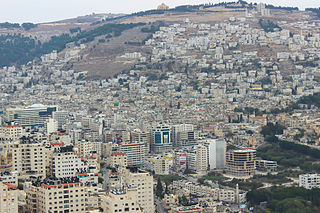
Nablus is a Palestinian city in the West Bank, located approximately 49 kilometres (30 mi) north of Jerusalem, with a population of 156,906. Located between Mount Ebal and Mount Gerizim, it is the capital of the Nablus Governorate and a commercial and cultural centre of the State of Palestine, home to An-Najah National University, one of the largest Palestinian institutions of higher learning, and the Palestine Stock Exchange. Nablus is under the administration of the Palestinian National Authority (PNA).

Palestine, officially known as the State of Palestine, is a country in the Levant region of West Asia. It is officially recognized as a state by the United Nations and numerous countries. Palestine shares borders with Israel to the east and north, Jordan to the east, and Egypt to the southwest. The state comprises the West Bank, including East Jerusalem, and the Gaza Strip. The population of Palestine exceeds five million people, and covers an area of 6,020 square kilometres (2,320 sq mi). Jerusalem is its proclaimed capital and the official language is Arabic. The majority of Palestinians practice Islam, while Christianity also has a significant presence.

The economy of the State of Palestine refers to the economic activity of the State of Palestine. Palestine receives substantial financial aid from international donors, including governments and international organizations. This aid is crucial for supporting the Palestinian Authority and funding public services and development projects. Palestinians working abroad send money back to their families in Palestine. These remittances provide a significant source of income for many households.

Tubas is a city in Palestine in the northeastern West Bank, located northeast of Nablus, west of the Jordan Valley. A city of over 21,000 inhabitants, it serves as the economic and administrative center of the Tubas Governorate of the State of Palestine. Its urban area consists of 2,271 dunams. It is governed by a municipal council of 15 members and most of its working inhabitants are employed in agriculture or public services.

This article describes transport in the State of Palestine, which consists of two non-contiguous territories, the West Bank and the Gaza Strip, different parts of which are administered by Palestinian National Authority, Hamas Administration in Gaza and Israel.

An-Najah National University is a Palestinian non-governmental public university governed by a board of trustees. It is located in Nablus, in the northern West Bank. The university has 22,000 students and 300 professors in 19 faculties. It is the largest university in the State of Palestine.
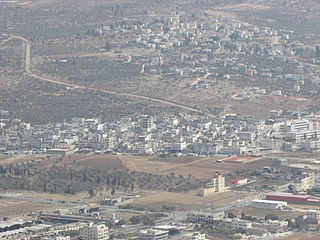
Askar is a Palestinian refugee camp. It is located on the outskirts of the West Bank city of Nablus and was established in 1950 on 119 dunums of land. Residents of the camp refer to this as “New Askar”.
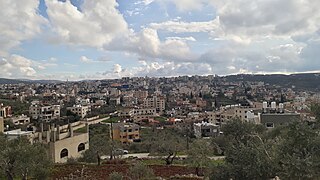
Salfit is a Palestinian city in the central West Bank, and the capital of the Salfit Governorate of the State of Palestine. Salfit is located at an altitude of 570 meters (1,870 ft), adjacent to the Israeli settlement of Ariel. According to the Palestinian Central Bureau of Statistics (PCBS), Salfit had a population of 10,911 in 2017. Since the 1995 Interim Agreement on the West Bank and the Gaza Strip, Salfit, located in Area A, has been administered by the Palestinian National Authority, while continuing under Israeli military occupation.

The following outline is provided as an overview of and topical guide to the State of Palestine:

Yanun is a Palestinian village in the Nablus Governorate of the State of Palestine, in the northern West Bank, located 12 kilometers (7.5 mi) southeast of Nablus, and 3 miles north of Aqraba. It lies within Area C, under total Israeli control, of the West Bank. It is divided into two sites, upper and lower Yanun. Upper or northern Yanin is considered illegal by the Israeli authorities, and development is prohibited there.
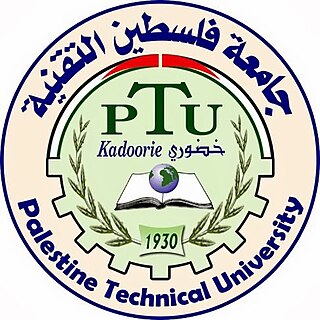
Palestine Technical University - Kadoorie (Formerly known as Tulkarm Community College)is an agricultural college located in Tulkarm, in the northern West Bank. The college was inaugurated in 1930 after the British Government had received a bequest from the Iraqi-born Jewish philanthropist Sir Ellis Kadoorie. The college was named in his honour and still bears his name.

Rawabi is the first planned city built for and by Palestinians in the West Bank, and is hailed as a "flagship Palestinian enterprise." Rawabi is located near Birzeit and Ramallah. The master plan envisages a high tech city with 6,000 housing units, housing a population of between 25,000 and 40,000 people, spread across six neighborhoods.

Tourism in the Palestinian territories is tourism in East Jerusalem, the West Bank, and the Gaza Strip. In 2010, 4.6 million people visited the Palestinian territories, compared to 2.6 million in 2009. Of that number, 2.2 million were foreign tourists while 2.7 million were domestic. In the last quarter of 2012 over 150,000 guests stayed in West Bank hotels; 40% were European and 9% were from the United States and Canada. Major travel guides write that "the West Bank is not the easiest place in which to travel but the effort is richly rewarded."
Nablus Library is the oldest and largest public library in the West Bank, Palestine. The library was established by the municipality of Nablus with aid from the Jordanian government in 1960. The building itself is a 19th-century Ottoman-era structure, which was a cafe in its former life. Surrounding the library building is a garden, used as a community space for lectures and events. During the First Intifada, while most schools and universities in the West Bank were shuttered, Nablus Library remained open. In the late 1990s, the library opened a children's department for the first time. As of late 2013, the library was constructing an audiovisual room.

Nabulsi soap is a type of castile soap produced in Nablus in the West Bank, Palestine. Its chief ingredients are virgin olive oil, water, and an alkaline sodium compound, such as sodium hydroxide. The finished product is ivory-colored and has almost no scent. Traditionally made by women for household use, it had become a significant industry for Nablus by the 14th century. In 1907 the city's 30 Nabulsi soap factories were supplying half the soap in Palestine. The industry declined during the mid-20th century following the destruction caused by the 1927 Jericho earthquake and later disruption from the Israeli military occupation. As of 2008, only two soap factories survive in Nablus. The old Arafat soap factory has been turned into a Cultural Heritage Enrichment Center.
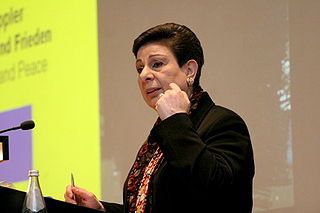
Hanan Daoud Mikhael Ashrawi is a Palestinian politician, activist, and scholar.
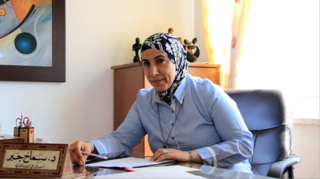
Samah Jabr is a Palestinian Jerusalemite psychiatrist, psychotherapist and writer. Since 2016, she has been Chair of the Mental Health Unit at the Palestinian Ministry of Health, and has written columns about the psychological consequences of the Israeli occupation in Palestine since the 2000s. Inspired by anticolonial psychiatrist Frantz Fanon, her areas of interest include mental health, colonialism and universal human rights.
References
- ↑ "Project Hope". projecthope.ps. Retrieved 30 June 2020.
- ↑ "PROJECT HOPE BRINGS HEALTH". AgriLife Today. 19 June 2003. Retrieved 30 June 2020.
- ↑ Israeli military occupation [ permanent dead link ]
- ↑ "Bringing hope to Palestinians". thestar.com. 19 June 2009.
- ↑ Upvall, Michele Jean; Leffers, Jeanne (14 April 2014). Global Health Nursing: Building and Sustaining Partnerships. Springer Publishing Company. ISBN 978-0-8261-1868-4.
- ↑ "2013 Annual Report « Project Hope – Peace and Education in Palestine". Archived from the original on 14 July 2014. Retrieved 4 July 2014.
- ↑ "2013 Annual Report « Project Hope – Peace and Education in Palestine". Archived from the original on 14 July 2014. Retrieved 4 July 2014.
- projecthope.ps/organizational-news/2013-annual-report/ retrieved 3 July 2014
- www.globalpolicy.org/.../israel-palestine-and-the-occupied-territories-html retrieved 4 July 2014
- www.thestar.com/news/2009/06/19.bringing_hope_to_palestinians.html retrieved 3 July 2014
- www.savethechildren.org.uk retrieved 4 July 2014
- Nablus Guide: Culture, Society, Tourism in Nablus, West Bank, Palestine retrieved 4 July 2014